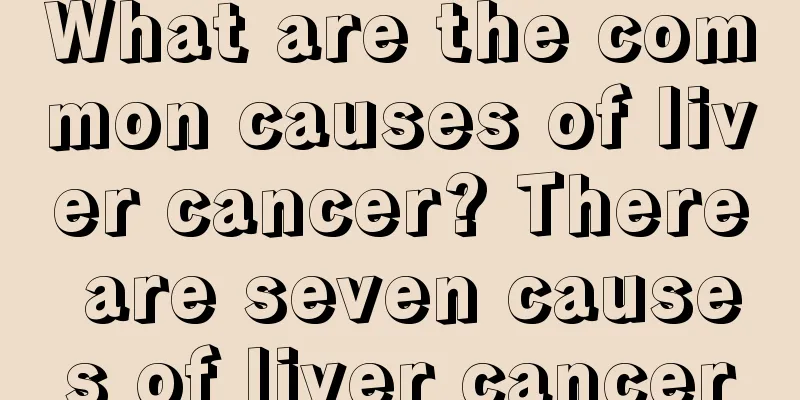What are the common causes of liver cancer? There are seven causes of liver cancer

|
Overnutrition (macronutrients) or nutritional deficiency (such as vitamin A, B1 deficiency), hemochromatosis, parasitic infection and heredity are also risk factors for liver cancer. At present, the cause of liver cancer is still unclear, but according to clinical research and summary, some factors that may lead to liver cancer can be determined, such as some high-risk groups. In addition, in most cases, clinically, it often refers to primary liver cancer, which is a type of malignant tumor and is very common. The following is a summary of the common causes of liver cancer: (1) Viral hepatitis: mainly hepatitis B and C virus infections, especially hepatitis B and hepatitis B virus carriers, whose incidence of primary liver cancer is 2 to 100 times higher than that of normal people; in areas with a high incidence of liver cancer, about 20% of people may be hepatitis B or hepatitis B virus carriers. (2) Aflatoxins (AFT): Aflatoxin B is the most important carcinogen. It thrives in high temperature and high humidity environments, especially in summer when moldy food, grains, and feed are most likely to be contaminated by Aspergillus flavus and produce aflatoxins. Long-term consumption of food containing this toxin can induce liver cancer. (3) Water pollution: Severe pollution of drinking water is one of the important causes of liver cancer, especially polluted ditch water, followed by river water, and well water. Therefore, in villages without tap water facilities, drinking well water should be encouraged. (4) Chemical carcinogens: Chemical substances that can cause liver cancer are mainly N-nitroso compounds, such as nitrosamines and nitrosamides. In addition, pesticides, alcohol, safrole, etc. can also induce liver cancer. (5) Other factors: Overnutrition (macronutrients) or nutritional deficiency (such as vitamin A, B1 deficiency), hemochromatosis, parasitic infection and heredity are also risk factors for liver cancer. (6) Immune status: Some people believe that the plasma of liver cancer patients contains a blocking factor that can inhibit cellular immunity and protect liver cancer cells from being killed by immune cells. It has been proven that alpha-fetoprotein (AFp) can inhibit the phagocytosis of lymphocytes and macrophages. (7) Gene mutation: In recent years, some people believe that mutagens and viruses in the environment stimulate the activation of liver cell division response pathways, causing point mutations and gene translocations in cells, which is a possible factor in accelerating the proliferation of cancer cells. In life, the biggest influence on liver cancer is alcohol, followed by some unhealthy diets, etc., mainly referring to unhealthy dietary structure. In addition to the above factors, there is another point that should be paid special attention to. Liver cancer has hereditary characteristics. Therefore, families with liver cancer should pay attention to the prevention of liver cancer. |
>>: What are the symptoms of lung cancer? Introduction to the clinical symptoms of lung cancer
Recommend
The preventive measures for cervical cancer are as follows
Cervical cancer occurs every year in China, and i...
What does stomach cancer look like when it appears
Patients with gastric cancer will feel some disco...
Can I eat a pumpkin that is a bit bitter?
Pumpkin is rich in carotene and vitamin C, which ...
What causes sigmoid colon cancer
Sigmoid colon cancer is a type of colon cancer. E...
What is the most effective way to treat nasal mucosal erosion
When it comes to the treatment of nasal mucosal e...
Symptoms before death from late stage bile duct cancer
Cholangiocarcinoma is one of the common malignant...
What should I do if the middle of my tongue is black? What to pay attention to
The normal color of the tongue coating is white, ...
Can early stage lung cancer be cured?
Lung cancer can be cured in the early stages, but...
How to make corn dumplings
The taste and nutritional value of corn are outst...
Can chicken's gizzard lining cure gallstones? Is the folk remedy effective?
There are also many Chinese herbal remedies for t...
Is betel nut addictive?
Betel nut has a unique taste. Many people like to...
What are the dangers of not eating breakfast in the morning
My friends and their couple watched TV and played...
Clinical pathological staging of colon cancer
The purpose of understanding the staging of colon...
What are the common complications of thyroid cancer
Many diseases can easily cause complications if t...
How to wash oil stains on clothes
Some people like to wear light-colored clothes, t...









